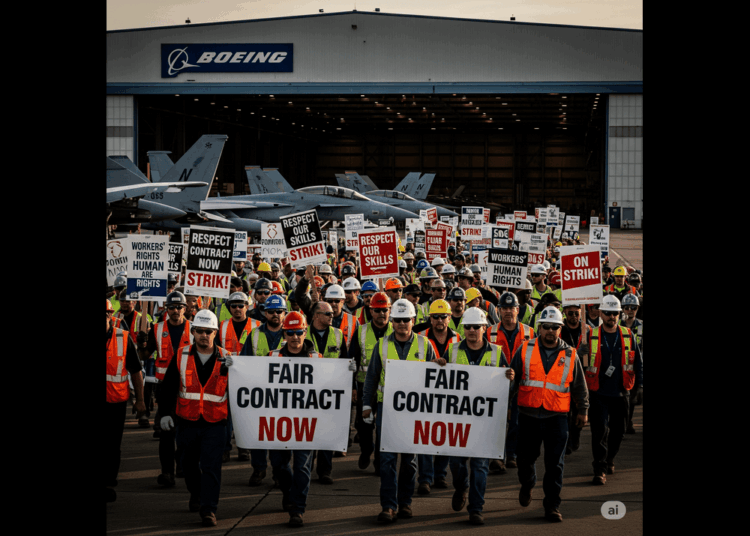Boeing Fighter Jet Workers Strike After Rejecting New Contract
Aug 4 (Reuters) – More than 3,200 unionized employees at Boeing’s (BA.N) defense manufacturing plants in St. Louis, Missouri, and Illinois have gone on strike after rejecting a second contract proposal. The strike, led by members of the International Association of Machinists and Aerospace Workers’ District 837, began Monday and affects the assembly lines of key fighter jets and military aircraft.
The proposed four-year contract offered by Boeing included a 40% average wage increase, a 20% general wage hike, a $5,000 ratification bonus, improved periodic raises, more vacation time, and additional sick leave. Despite these terms, union members overwhelmingly voted against the offer, marking the second rejection within a week.
Dan Gillian, Boeing vice president and general manager of St. Louis facilities, expressed disappointment, stating:
“We’re disappointed our employees in St. Louis rejected an offer that featured 40% average wage growth. We remain committed to resolving this matter.”
Workers Demand Contract Reflecting Their Role
Tom Boelling, head of District 837, said in a statement that workers deserve a contract that truly represents their skills and dedication:
“Our members play a critical role in building aircraft essential to our nation’s defense. They deserve a contract that values their expertise and commitment.”
The strike primarily impacts Boeing’s defense division, responsible for assembling F-15 and F/A-18 fighter jets, the T-7 training jet, and the MQ-25 aerial refueling drone for the U.S. Navy.
Boeing’s Contingency Plan and Impact
Boeing Defense stated that it had anticipated the strike and prepared a contingency plan involving non-labor workers to minimize disruption. The company is also expanding its St. Louis manufacturing facilities to build the new F-47A fighter jet after winning a U.S. Air Force contract earlier this year.
Despite the work stoppage, Boeing CEO
downplayed its long-term impact. During a recent earnings call, he reminded analysts of a seven-week strike last year by District 751 workers in the Northwest:
“I wouldn’t worry too much about the implications of the strike. We’ve managed similar situations before and will do so again.”
District 751’s previous strike concluded with a four-year agreement that included a 38% wage increase, setting a recent precedent for labor negotiations within the company.
Broader Labor Context
This strike highlights ongoing labor tensions in the aerospace sector as workers seek fairer wages, better benefits, and recognition of their role in national defense. Analysts note that the outcome of this strike could shape future labor relations in Boeing’s defense manufacturing operations and impact ongoing military aircraft production schedules.
While Boeing maintains confidence in navigating the strike, prolonged disruptions could challenge delivery timelines for critical defense programs. The company and District 837 are expected to return to negotiations as pressure mounts from both sides to reach a resolution.
For more insights into major labor movements, aerospace industry developments, and corporate negotiations shaping defense manufacturing, visit IMPAAKT, a leading top business magazine covering global business and labor trends.











